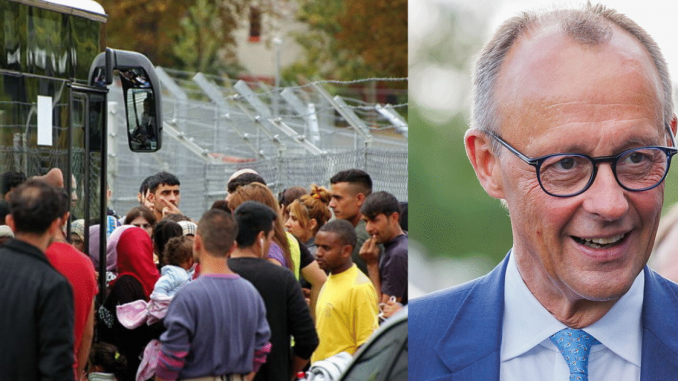
German Chancellor Friedrich Merz moves to tighten refugee policy as camps across Germany remain overcrowded. (wikimedia)
Published November 10, 2025
Germany has officially acknowledged what many border-security advocates have long argued — that open-border policies carry long-term social and political costs. In a move that signals a dramatic policy shift, German Chancellor Friedrich Merz announced that the civil war in Syria is now over, removing automatic grounds for asylum for roughly one million Syrian refugees living in Germany since 2015.
“The civil war in Syria is over. There are now no longer any grounds for asylum in Germany, and therefore we can also begin with repatriations,” Merz declared in Berlin.
The announcement marks a turning point in Germany’s migration stance, after a decade of accommodating millions of asylum seekers under former Chancellor Angela Merkel’s “open-door” policy. Merz’s government is now preparing formal repatriation and deportation programs, prioritizing those with criminal records.
Germany Reverses Course
Germany’s shift comes after the reopening of its embassy in Damascus earlier in 2025 and the government’s invitation to Syrian leader Ahmed al-Sharaa to discuss the logistics of returning refugees. The move signals official re-engagement with Syria and a policy stance that many European analysts call “a full circle” from the 2015 migrant crisis.
According to Reuters, Merz emphasized that while Germany remains committed to humanitarian principles, permanent asylum cannot continue for those whose home country is deemed safe. The government aims to begin deportations “in the near future,” though no exact numbers or timelines have been released.
Political and Public Pressure
Public frustration over migration-related crime and social integration challenges has grown steadily. Conservative and far-right parties have gained ground in recent elections, capitalizing on voters’ concerns over safety, housing shortages, and cultural tension.
Frontpage Mag cited statistics alleging that Syrian migrants were linked to over 100,000 crimes in 2024, reinforcing the public sentiment that the system needs reform. While German authorities have not confirmed those numbers, official data do show higher crime rates among specific male refugee demographics — an issue the Merz administration has vowed to address.
Echoes of Trump’s Border Warning
Commentators in the United States, including The Gateway Pundit, noted that Germany’s reversal “admits that Trump was right” about the risks of uncontrolled migration. Trump’s long-standing argument — that border enforcement is not xenophobia but national security — now resonates even among nations that once criticized his approach.
European leaders who once praised humanitarian openness are now re-evaluating their own systems. Germany’s admission reflects a broader European recalibration on migration, as countries like Denmark, Austria, and the Netherlands tighten asylum and deportation policies.
Unresolved Humanitarian Questions
Despite political momentum, humanitarian organizations warn that conditions in Syria remain unstable. Many areas still lack reliable infrastructure, medical services, or safe housing. Germany’s Foreign Minister Johann Wadephul acknowledged that mass deportations could face both legal and moral challenges under international refugee law.
Germany’s government insists that deportations will initially focus on individuals convicted of crimes or those who voluntarily choose to return with financial incentives. However, the long-term plan may affect thousands of families who have built lives in Germany over the past decade.
 Implications of Germany’s Repatriation Policy:
Implications of Germany’s Repatriation Policy:
1. A Turning Point in Europe’s Migration Philosophy
Germany’s decision signals a continental shift from humanitarian-driven asylum toward security-based migration control.
-
Other European nations like Denmark, Austria, and the Netherlands have already tightened rules for asylum seekers and begun reviewing “safe zones” for repatriation.
-
Berlin’s move effectively gives political cover for others to follow suit, possibly marking the end of Europe’s decade-long “open-door” era that began in 2015.
2. Legal and Humanitarian Repercussions
Repatriating over a million Syrians will test both international law and European human rights frameworks.
-
The Geneva Convention protects refugees from being returned to unsafe conditions — meaning Germany must legally justify its claim that Syria is now “safe.”
-
NGOs and humanitarian groups are expected to challenge mass deportations in European courts, prolonging the process and keeping the issue in global headlines.
3. Domestic Social and Political Impact
Germany’s internal politics could be reshaped by how repatriations are handled.
-
A successful policy may strengthen the Merz government and marginalize far-right movements by proving that mainstream conservatives can deliver on border control.
-
Conversely, any humanitarian scandal or mass deportation footage could spark protests and revive pro-refugee sentiment.
-
Local municipalities, already struggling with integration costs, may experience short-term relief in housing and welfare burdens.
4. Economic and Labor Market Consequences
While the policy targets refugees, it may inadvertently affect Germany’s labor market, which relies heavily on migrants for essential industries such as logistics, healthcare, and service work.
-
If repatriations proceed on a large scale, Germany could face labor shortages — prompting the government to look for alternative labor sources in Eastern Europe or Asia.
-
This opens opportunities for labor-exporting nations such as the Philippines to expand their presence in Europe’s service sectors under regulated migration agreements.
5. Global Ripple Effect
Germany’s stance may embolden other Western nations — including the U.S., Canada, and Australia — to reassess refugee and border policies.
-
The move validates the “controlled-border” doctrine long promoted by leaders like Donald Trump, now being echoed even in traditionally liberal societies.
-
Developing nations may interpret Germany’s action as a green light to adopt stricter immigration screening or to renegotiate bilateral labor deals with Europe.
6. Reputational and Diplomatic Balancing Act
Germany’s global image as a humanitarian leader is being tested.
-
Berlin must balance between maintaining moral authority and responding to voter demands for order and security.
-
Re-engagement with Damascus could improve Germany’s diplomatic leverage in the Middle East but risks criticism from allies who still view the Syrian government as repressive.
7. Outlook for Migrant Policy Worldwide
The broader message is unmistakable: the era of automatic asylum and unconditional refugee protection is waning.
-
Governments are redefining “protection” to mean temporary shelter until home conditions improve, rather than permanent relocation.
-
This redefinition could reshape global migration flows for decades — moving the debate from compassion versus control to how nations balance both.
 Overall Takeaway:
Overall Takeaway:
Germany’s reversal on its open-door asylum policy marks the end of an era — not only for Europe’s migration model but for the moral politics that once defined it. The government’s declaration that Syria is now “safe” for returnees reflects a wider acknowledgment: unlimited humanitarian acceptance is no longer sustainable in a world of political volatility, economic strain, and cultural fragmentation.
Chancellor Friedrich Merz’s stance may be seen by critics as cold pragmatism, but to many Germans, it is overdue realism. A decade of rising costs, public unease, and integration challenges has convinced much of Europe that strong borders and compassionate governance can — and must — coexist. In that sense, even nations that once dismissed border enforcement as harsh now quietly accept that security and stability are the foundation of humanitarianism, not its opposite.
Beyond Germany, this shift will echo across Western capitals. The notion that national sovereignty must guide migration policy — once associated with populist movements — has now entered mainstream policy debate. Whether other countries follow Germany’s lead or resist it, one truth stands firm: the migration crisis of the past decade has permanently reshaped how the world defines compassion, responsibility, and control.
For millions of refugees and migrants, the coming years will be uncertain. For governments, the challenge will be finding balance — ensuring safety without surrendering humanity. Germany’s decision, however controversial, underscores one defining reality of our time: the world’s borders are being redrawn not by walls, but by the hard lessons of experience.
SOURCES: THE GATEWAY PUNDIT – Germany Admits Trump Was Right on Borders After Taking in One Million Syrian Refugees
FRONT PAGE MAGAZINE – Will Germany Deport 1.2M Syrian “Refugees”?





Be the first to comment